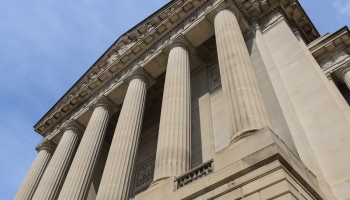US Banks ‘Stable’ as COVID-19 Crisis Unfolds
Credit rating agency KBRA is confident of capital positions but warns on banks exposed to hospitality, agriculture and energy
- |
- Written by Banking Exchange staff

The US banking sector remains in a stable financial position despite the unfolding COVID-19 coronavirus pandemic, according to credit rating agency KBRA.
For the vast majority of banks, the rating agency said, the main impact was likely to stem from falls in consumer and commercial confidence as the economy slows. A broad economic slowdown was “manageable”, it said.
The number of problematic loans could rise “considerably”, KBRA said, but it was likely to “remain manageable” given most banks are in a stronger financial position than they were before the 2008 financial crisis.
“Credit profiles of major US banks are materially stronger than in the past,” the rating agency said in a credit impact report published this week. “Profitability for these institutions will likely diminish in the near term, in tandem with reduced capital markets activities, and could be pressured by rising asset quality problems. Capital and liquidity positions are expected to remain comfortable.”
However, there were a small number of banks that faced more direct issues due to their exposure to the energy and hospitality industries, which are among the sectors most immediately affected by actions taken to slow the spread of the virus.
The dispute between Saudi Arabia and Russia over oil supplies has hurt the energy market, and this will be coupled with lower business activity and weak pricing. Banks exposed to this sector have reduced it since the last major price downturn in 2015-16, KBRA said, and “have extensive experience managing and monitoring energy portfolio risks”.
Banks that lend to hotels, retail centers, restaurants and other hospitality areas generally have “small-to-moderate” exposure within their loan portfolios, the report said, or have strong experience and conservative approaches to loan-to-values and debt service coverage.
“Nevertheless, we are monitoring any banks with outsized exposure carefully, given the ongoing slowdowns in travel and retail traffic, and will take appropriate rating action as needed,” KBRA said.
“In addition, commercial real estate projects that rely on retail traffic to restaurants, malls, strip centers, fitness centers, movie theaters, among others, to help drive sales or leases are potentially vulnerable.”
Agriculture loans could also be affected by the crisis, but most banks have minimal exposure to this sector. KBRA said “a limited number” had sizeable portions of their loan books exposed to agriculture, but also had “deep experience in agricultural lending combined with long-term customer relationships and appropriate monitoring capabilities”.
The rating agency concluded: “For major US banks, recent market turmoil, especially if prolonged, will likely result in a considerable decline in revenues from capital markets and international activities.
“Typically, the first quarter is the strongest for capital market activities including trading, underwriting, and advisory. Consequently, major banks could be impacted by lower profitability, but overall credit profiles are expected to remain strong.
“In addition, liquidity for the banking sector could be boosted by the combination of higher deposit balances and reduced loan demand as businesses and institutions become more cautious.”
Separately, Fitch Ratings said in an update on March 13 that it was “actively assessing” bank and non-bank financial institutions with a focus on the operational impact of the crisis, funding and liquidity pressures, and the impact on earnings from lower interest rates and falling business volumes.
Fitch said it was already factoring in earnings pressures related to low interest rates for many financial services companies prior to the COVID-19 outbreak, which had been increasing negative pressure on its ratings.
“The multi-pronged impact of the human and financial implications of the global outbreak of the coronavirus and the sharp drop in oil prices represent a major shock to our base case assumptions,” the agency said.
“While we endeavor to rate ‘through the cycle,’ the nature of the coronavirus outbreak is unprecedented and clearly beyond any traditional or even stressed business cycle. The extraordinary nature of the outbreak, the magnitude of the responses and the speed at which the events are unfolding make it likely that we will see risks that have never before been observed.
“As such, financial institutions that are, or become, more sensitive to the outbreak and related financial market disruption will experience rating changes reflective of the circumstances.”













